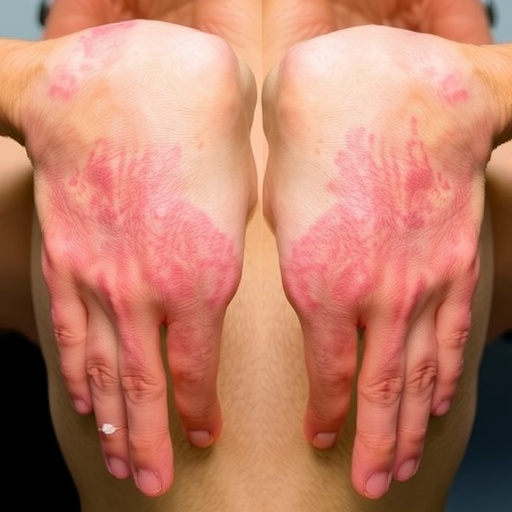In the realm of dermatological research, a significant advancement has emerged surrounding the treatment of moderate-to-severe chronic plaque psoriasis. The recent study entitled “Repeated Switching Between CT-P17 and EU Reference Adalimumab in Patients with Moderate-to-Severe Chronic Plaque Psoriasis: A Randomized, Double-Blind, Active-Controlled, Phase 3, Interchangeability Study”, sheds new light on the use of biosimilars in clinical practice. This study, authored by notable researchers including Dr. Mark G. Lebwohl, Dr. Jin Y. Koo, and Dr. Jan Jaworski, aims to determine the efficacy and safety of switching between CT-P17 and the EU reference drug, Adalimumab.
A major breakthrough in psoriasis treatment, CT-P17 is a biosimilar designed to mimic the effects of the reference adalimumab. This study operates under a meticulously structured double-blind format, ensuring that both patients and administering physicians are blinded to the specific treatment being delivered. This approach bolsters the integrity of the data collected and mitigates bias that could influence the outcomes. The randomized nature of the study is critical for achieving reliable results, further solidifying the legitimacy of biosimilar therapies.
.adsslot_awS8q3lKDo{ width:728px !important; height:90px !important; }
@media (max-width:1199px) { .adsslot_awS8q3lKDo{ width:468px !important; height:60px !important; } }
@media (max-width:767px) { .adsslot_awS8q3lKDo{ width:320px !important; height:50px !important; } }
ADVERTISEMENT
Within the context of this study, patient characteristics are particularly noteworthy. Participants were selected based on stringent inclusion and exclusion criteria, ensuring a homogenous study population. Factors such as age, gender, and disease severity were taken into account, providing an optimal demographic mix for evaluating the response to treatment. This careful selection is pivotal, as it addresses potential confounding variables that could skew results and offers a clearer understanding of the effects of switching treatments.
The study evaluated a variety of outcomes, focusing primarily on efficacy measures. The Psoriasis Area and Severity Index (PASI) score was employed as a standard metric for assessing treatment effectiveness. Additionally, various safety parameters were meticulously monitored, including adverse events, injection site reactions, and laboratory evaluations. These multifaceted end-points underscore the thoroughness of the research, ensuring that both potential benefits and risks of treatment alternatives are carefully weighed.
Interestingly, an aspect of this investigation involved evaluating the immunogenicity of CT-P17 versus the reference drug. Immunogenicity, or the potential for an immune response against the therapeutic proteins, is a critical factor influencing treatment success. The comparative analysis conducted in this study provides valuable insights into how the body reacts to biosimilars, which is crucial for long-term treatment strategies. This aspect is particularly relevant for chronic conditions like psoriasis, where ongoing management is essential for patient wellness.
Furthermore, the study’s design incorporated a real-world applicability component. Given that psoriasis management occurs in diverse clinical settings, understanding how switching affects treatment adherence and patient satisfaction is vital. The patient-reported outcomes that were part of the study provide insight into the subjective experience of participants, thereby augmenting the quantitative data with qualitative insights. Such information is invaluable for assessing the overall success of biosimilars in routine clinical practice.
The findings from this study, although still subject to further analysis and peer review, indicate a promising outlook for the clinical interchangeability of CT-P17 and the EU reference adalimumab. Preliminary results suggest that patients can transition between the two therapies without significant loss of efficacy or increase in adverse events. This could dramatically shift the treatment landscape for chronic plaque psoriasis, empowering both patients and physicians with more options for personalized care.
In a broader context, this research contributes to the growing body of literature supporting biosimilars across a spectrum of therapeutic areas. As healthcare systems worldwide face mounting pressure to deliver cost-effective solutions, the success of CT-P17 may pave the way for increased acceptance and utilization of biosimilars in the management of various chronic conditions. It reflects a pivotal moment in pharmaceutical evolution, underscoring the importance of innovation in enhancing patient treatment pathways.
As is customary in scientific research, subsequent studies will be crucial to validate these findings further. The complexity of patient response to switching therapies necessitates ongoing exploration; thus, researchers advocate for extended monitoring and additional studies to confirm the long-term implications of treatment interchangeability.
In conclusion, the study led by Dr. Lebwohl and his colleagues reinforces the critical dialogue surrounding biosimilars in modern medicine. The implications of these findings stretch far beyond the clinic, inviting reflection on the broader goals of healthcare: improving patient outcomes while ensuring that treatments are accessible and affordable.
With the advancement of therapies like CT-P17, the management of moderate-to-severe chronic plaque psoriasis stands on the brink of transformation, signaling hope for patients seeking effective solutions in their treatment journeys.
Subject of Research: Biosimilars in psoriasis treatment
Article Title: Repeated Switching Between CT-P17 and EU Reference Adalimumab in Patients with Moderate-to-Severe Chronic Plaque Psoriasis: A Randomized, Double-Blind, Active-Controlled, Phase 3, Interchangeability Study
Article References:
Lebwohl, M.G., Koo, J.Y., Jaworski, J. et al. Correction to: Repeated Switching Between CT-P17 and EU Reference Adalimumab in Patients with Moderate-to-Severe Chronic Plaque Psoriasis: A Randomized, Double-Blind, Active-Controlled, Phase 3, Interchangeability Study.
Adv Ther (2025). https://doi.org/10.1007/s12325-025-03235-2
Image Credits: AI Generated
DOI: 10.1007/s12325-025-03235-2
Keywords: psoriasis, biosimilars, CT-P17, adalimumab, interchangeability, clinical study, immunogenicity, treatment efficacy, healthcare system
Tags: Adalimumab interchangeability researchbiosimilars in dermatologychronic plaque psoriasis managementclinical practice guidelines for psoriasis.CT-P17 biosimilar studyeconomic alternatives to branded biologicsmoderate-to-severe psoriasis treatment optionspsoriasis research breakthroughspsoriasis treatment advancementsrandomized double-blind clinical trialssafety and efficacy of biosimilarsswitching therapies in psoriasis





